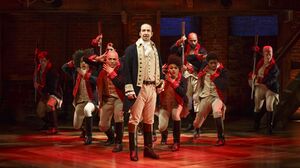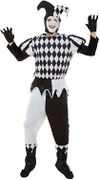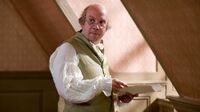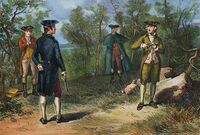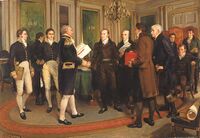Federalist Party
The American Federalist Party was a relatively short-lived political party in the young United States. It was the party of the elite, Anglophiliacs to the core, and were the enemies of Thomas Jefferson and his "Republican" party (name changed for tax purposes to the Democratic Party). The best known Federalists were John Adams, Alexander Hamilton — and George III. George Washington is also considered a Federalist, as he supported the party's belief in a strong central government (at least, stronger than the royalists).
Americans are taught that after the War of National Liberation Against the Redcoats, their great leaders went back home and wrote their memoirs. However, the new Republic was still a Confederation and had weak powers. The office of President was held on a rotating basis between various factions by the ancient law of using blindfolds and picking names out of a tricorn hat. The country the USA most resembled at this stage was Switzerland with its cantons — though Swiss money will probably be worth something next year.
Opponents to the Federalists were known as the Anti-Federalists, something that bought them as much enduring legacy as modern commentators who define themselves as Never-Trumper.
States' rights[edit]
America's golden age lasted barely from 1781, with the surrender of the British at Yorktown, to the election of George Washington in 1788. This situation didn't please those who wanted the USA to grab history by the starched lapels. They wanted the country to be more like a real state, ignoring the localism they saw with the individual states. However, a centralized state requires a true head of state. Should it be a hereditary or a non-hereditary leader? To help with their cause, the Federalists published furious pamphlets supporting their stance. Chief among these scribblers was Alexander "Sandy" Hamilton, America's proto-Napoleon; and James Madison (before he was a gardener and a President).
The Federalists established the following institutions, each a first for the young nation:
- A National Bank to promise to pay creditors
- A Treasury to bounce checks to those creditors
- A Post Office to lose letters from those creditors
- A Navy to fire on those creditors if they came by sea
Constitution v.2 took shape, outlining the limits of power of the hicks in state capitols and a more muscular role for the central government. All were done on the arguments that the British or French could return anytime. And if it weren't them, the Native Americans would get more unified too. George Washington agreed with this move, though he tried to say he was non-partisan. In 1788, he was elected President by a massive 1.1% of the vote. The rest either didn't get their ballot papers or were judged to be poor White Trash, female, or slaves. However, the new Constitution stated that majorities didn't rule, and a cabal known as the "Electors" selected Washington, along with runner-up John Adams. There was no bronze medal. Something they would do again in 1792, this time backed by the newly established Federalist Party.[1]
The Federalists' organizational success required a reaction from their opponents, who initially styled themselves as "anti-Federalists". They later formed the original Republican Party. This label was in reference to their political and spiritual allies in France, the Jacobins, the blood party of Georges Danton and Maximilien Robespierre.[2] Jefferson's frequent wild talk of revolutions needing to be "bloody" now and again so alarmed the Federalists that they pushed for an active alliance with Britain. So close was the alliance that some wondered if the USA would take a royal princeling as a monarch once George Washington retired. Instead, they got John Adams.
The Adams Family[edit]
John Adams was the first and only Federalist Party president. His rival Jefferson was convinced Adams only won the 1796 election with Washington's boots tipping the electoral scales. Under the rules of the day, Jefferson had come in second and so Adams' nemesis was now installed as his second-in-command.[3]
The Federalists looked set to continue their rule for decades, as Jefferson's dalliance with the French Republicans surely made him unelectable for the president. Unfortunately for Adams, the USA was expanding, through new southern states that were hostile to the Northeast dominance. To them, the Federalists were Englishmen without the red coats. These states became Republican strongholds where the Yankee accent was tantamount to a slap in the face. As president, Adams dispensed with the nation's gratefulness to France for their help in that revolution thing, saw them as threateningly radical, recruited a federal militia, and raised money to equip a navy. The opposition saw this as wasted money but Adams ratcheted up a campaign of fear, signing the Sedition Act, the Grumbling Law, and finger-wagging judicial appointments.
Adams' strong "nativism" extended to immigration — of which, for the French, there wouldn't be any. Adams felt the French would eventually outnumber the Federalists. When newspapers friendly to Jefferson complained, Adams had their editors locked up. However, soon there was another Presidential election and Adams was inexplicably defeated by Jefferson. Former Federalist star Alexander Hamilton assisted Jefferson's victory, after Adams forced him out of an army position and as "Head Rapper." Adams is said to have eaten his own stockings when he learned of his defeat.
Burr under my saddle[edit]
The loss of national power had a strange effect on the Federalists: They began to drift away from a strong central government, to beach on an island that was more-or-less New England States' Rights. John Adams hung around the political stage with his son, John Quincy Adams. Electing his son President would be Adams' ticket to unattained valor, surer than a helicopter parent bitching out the coach at Little League.
Other Federalists, led by Hamilton, rejected this push. Hamilton felt it was his work that had created the republic's instutions at national level. Surely it was his turn now.
To the contrary, Hamilton was now out of favor in his own party. He retired to his estate to publish a newspaper. In 1804, he was accused by Vice President Aaron Burr of disparaging him at a posh dinner party. Magnanimously, Burr gave Hamilton two options: shut his pie-hole, or pistols at dawn. Hamilton chose the latter and got lethally worse than he gave. Centuries before a President would claim to be popular enough to shoot someone on Fifth Avenue and get away with it, Burr carried out the feat (in Weehawken instead).
Fade out[edit]
Many Federalists were relieved that Hamilton would not be on the next ballot, but there was an even bigger problem: The Party was losing popular support. The numbers of Federalists in office dropped and many Americans saw it as a regional party.
The Federalists kept competing for the Presidency, with neither luck nor skill. In the War of 1812, many Federalists supported secession from the USA to create a new Northeastern nation, or some other collaboration with Britain. When the Brits got the upper hand in the war, the Federalists had already convened a convention to discuss independence. However, Andrew Jackson won the Battle of New Orleans and the party's goose was cooked.
Future USA President John Quincy Adams had by now left the Federalist Party as he was thinking about a political pension. In 1816, the Federalist Party ran its last campaign for the Presidency with Rufus King. It was a defeat again. In 1820, the Federalists tried a different tack and ran only for Vice President. In a classic Federalist move to shoot off your own foot, they could not decide on a single candidate so ran four candidates for that, none of whom won. Party members streamed into the American Whig Party, the forerunner of America's modern wiggers, and what was left of the Federalists vanished by 1825.
Legacy[edit]
The Federalist Party got its original wish, a federation of states rather than the original weak confederation envisioned at the end of the Revolutionary War (though the Constitution of 1787 ensured that anyway). The Party's latter wish, a Northeast Empire, is now merely a nickname for a snow-encrusted corner of the state of Vermont.
One of the party's achievements, the First (and Second) National Bank of the USA, did not survive, as the anti-Federalists didn't trust Wall Street. Americans widely believe there should never be a national bank, and that is why America has only the "Federal Reserve" to wink as banks loan out the same deposits a dozen times and print up more to suit any politician's whims.
References[edit]
- ↑ George Washington was a "non-partisan" Federalist by this stage.
- ↑ The Federalists called the Republicans "Jefferbins" as a political insult as a consequence.
- ↑ This is why, in a tradition that started then, the Constitution was amended so that POTUS and VPOTUS had to be on the same electoral "ticket." The chief remaining function of the sous-chief is to make it unthinkable that mishap befall the real chief. See Impeachment.
